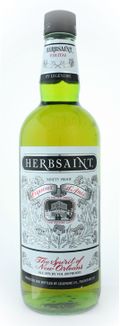Herbsaint: Difference between revisions
Jump to navigation
Jump to search
Uncle Jesse (talk | contribs) (Add category) |
Uncle Jesse (talk | contribs) (Adding image) |
||
| Line 1: | Line 1: | ||
Herbsaint is a brand name of [[Anise|anise]]-flavored [[liqueur]], made in New Orleans, Louisiana. | Herbsaint is a brand name of [[Anise|anise]]-flavored [[liqueur]], made in New Orleans, Louisiana. | ||
[[file:herbsaint.jpg|thumb|120px|right|Bottle of Herbsaint]] | |||
It originated in the 1850s as a cheaper domestic alternative to the French-made [[absinthe]] then rapidly gaining in popularity, especially among intellectual and artistic circles. When absinthe was banned in the United States in 1912, it was forced to cease production, but was later reintroduced in a formulation without the banned [[wormwood]], as an American version of [[pastis]]. While still produced today, it is now rarely drunk, and is instead used primarily for cooking, most notably as a standard ingredient in the sauce of New Orleans's famous Oysters Rockefeller. | It originated in the 1850s as a cheaper domestic alternative to the French-made [[absinthe]] then rapidly gaining in popularity, especially among intellectual and artistic circles. When absinthe was banned in the United States in 1912, it was forced to cease production, but was later reintroduced in a formulation without the banned [[wormwood]], as an American version of [[pastis]]. While still produced today, it is now rarely drunk, and is instead used primarily for cooking, most notably as a standard ingredient in the sauce of New Orleans's famous Oysters Rockefeller. | ||
Revision as of 21:54, 13 September 2017
Herbsaint is a brand name of anise-flavored liqueur, made in New Orleans, Louisiana.
It originated in the 1850s as a cheaper domestic alternative to the French-made absinthe then rapidly gaining in popularity, especially among intellectual and artistic circles. When absinthe was banned in the United States in 1912, it was forced to cease production, but was later reintroduced in a formulation without the banned wormwood, as an American version of pastis. While still produced today, it is now rarely drunk, and is instead used primarily for cooking, most notably as a standard ingredient in the sauce of New Orleans's famous Oysters Rockefeller.
